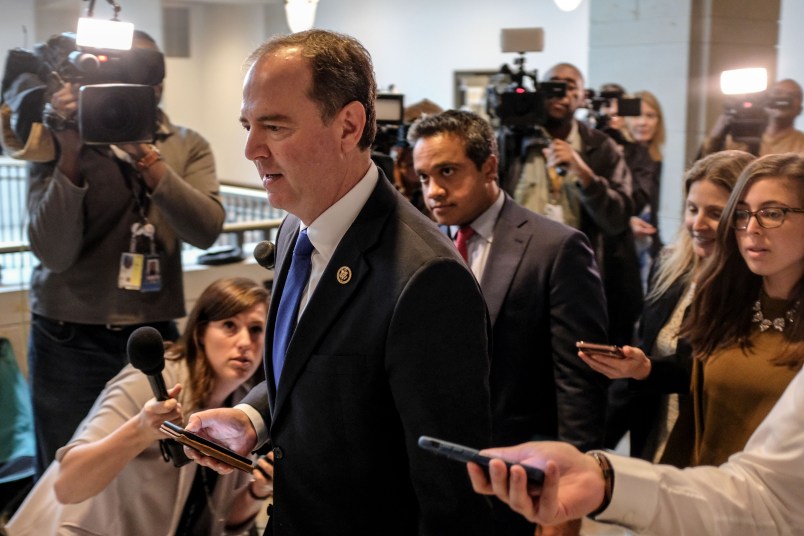The House impeachment inquiry will enter a new phase Wednesday when the congressional investigation grills its first witnesses in public.
Bill Taylor, the acting Ukraine ambassador, and George Kent, the deputy assistant secretary of state for Europe and Eurasian affairs, both participated in closed-door depositions last month. But most Americans understandably haven’t found the time to read through their existing testimony transcripts, which clock in at 324 pages and 355 pages, respectively.
So the public hearings will serve as Democrats’ grand jury room — an opportunity to make a televised case to the American people that the President’s actions are impeachable.
Based on Taylor and Kent’s testimonies, as well as those of other witnesses who interacted with them, we have a rough idea of what the two witnesses know. Here’s what Democrats need from them to make a case for impeachment.
Bill Taylor
Taylor took over as acting Ukraine ambassador in June after the sudden recall of former Ambassador Marie Yovanovitch the previous month. An experienced diplomat, Taylor saw (and criticized) the efforts of Trump administration officials to press Ukraine to announce investigations that would be helpful to Trump’s 2020 reelection effort.
A first-hand account. As Trump and others worked to mold Ukraine policy for political gain, Taylor experienced the pressure campaign first hand. He worked (and texted with) the two Trump officials who were most involved in pressing Ukraine for investigations — EU Ambassador Gordon Sondland and then-Ukraine special envoy Kurt Volker — and kept detailed notes of his every conversation.
Sondland and Taylor, as well as the Ukrainians with whom they interacted, provided information to Taylor on the push for politicized investigations in Ukraine, a “deliverable” that Trump wanted.
Taylor also spoke frequently with officials on the other side of the coin — career national security experts at the State Department and on the National Security Council who were flummoxed by the shadow foreign policy channel that Trump had empowered.
Taylor’s experience roots this pressure campaign in the real world: For example, during a visit to the frontlines of the ongoing war between Ukraine and Russia, Taylor was burdened with the “uncomfortable” knowledge that the White House had placed a hold on an aid package for Ukraine worth nearly $400 million.
An expert on Ukraine. Taylor has been in his current position for just a few months, but it’s actually his second time leading the U.S. mission in Ukraine — he previously served as U.S. ambassador to Ukraine from 2006 to 2009. So he’s familiar with Ukrainian history, the country’s struggle with corruption, and the hope in the diplomatic community after the election of outsider Volodymyr Zelensky in April.
Republican talking points on Trump’s pressure campaign insist the President was simply concerned about corruption in Ukraine. Taylor will be able to testify that Trump’s gloss sounds nice, but his insistence on particular investigations of his political rivals is the opposite of the U.S. anti-corruption agenda in Ukraine.
George Kent
As the State Department official in charge of overseeing policy in Ukraine, Kent was receiving information from diplomats at home and abroad about the politicization of that policy. He also dealt with the fallout after Yovanovitch’s recall, which damaged department morale.
Marie Yovanovitch’s story. Yovanovitch, the recalled Ukraine ambassador, will testify publicly for herself on Friday, the third public witness to do so.
Yovanovitch’s ouster may seem tangential to the pressure campaign now at the heart of the impeachment inquiry, but it marked a key turning point. Some of Giuliani’s initial efforts in Ukraine were aimed at the ambassador, rather than Joe Biden, and the Ukrainians feeding the former New York City mayor and his associates information on Yovanovitch would later provide fodder for Giuliani’s other work. And in September, when the White House released the call between Trump and Zelensky, Trump’s attacks against Yovanovitch put a huge dent in department morale.
Details on the “irregular” Ukraine actors. The Giuliani-led “irregular” foreign policy channel in Ukraine kept chugging after Yovanovitch was recalled, to the chagrin of the diplomatic bureaucracy in D.C.
As Rudy pursued Trump’s interests, rather than those of the United States, Kent dealt with the consequences. For example, he parried a request from Giuliani to get a visa for Viktor Shokin, the former Ukrainian prosecutor general whose firing Republicans have used to accuse Joe Biden of corruption.
Kent was impacted by this irregular channel, too: After Giuliani targeted him and others in an interview in May, Kent said he was told to “keep my head down and lower my profile in Ukraine.”







Like the released transcripts in which people generally only have time to read the summaries, not too many people will be able watch the hearings in full.
However the summary of open testimony will be in the form of clips, or the “Highlight Reel”. This will show the seriousness of these sober public servants. This will be easier to consume for your average person.
I also think that Republicans will overplay their actions and looks the BSing fools that they are. It will also leave them subject to parody.
Happy Impeaching the Motherfucker Day! @tena
Today’s hearings are going to interfere with any serious work getting done today.
I don’t think that matters to most and the ones that it does bother complain they’re being bullied to their base.
Must. Not. Give. In. To. Temptation!